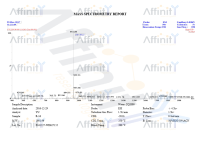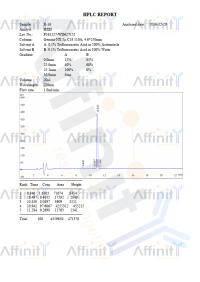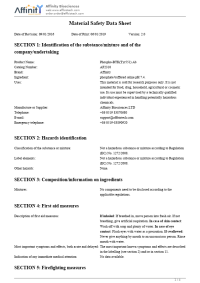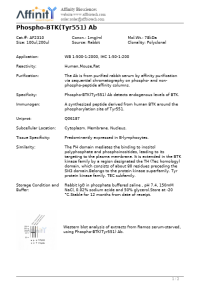Affinity Biosciences
AF2310
$280.00
100μl
| 100μl - | $280.00 | |
| 200μl - | $350.00 |
Phospho-BTK(Tyr551) Antibody
 Western blot analysis of extracts of Ramos serum-starved, using Phospho-BTK(Tyr551) Antibody....
Western blot analysis of extracts of Ramos serum-starved, using Phospho-BTK(Tyr551) Antibody.... AF2310 at 1/100 staining Rat brain tissue by IHC-P. The sample was formaldehyde fixed and a heat...
AF2310 at 1/100 staining Rat brain tissue by IHC-P. The sample was formaldehyde fixed and a heat... ELISA analysis of AF2310 showing specificity to Phospho-BTK(Tyr551) peptide. Peptides concentration:...
ELISA analysis of AF2310 showing specificity to Phospho-BTK(Tyr551) peptide. Peptides concentration:...Antigen:
Tyrosine-protein kinase BTK
Synonyms: Agammaglobulinemia tyrosine kinase; B-cell progenitor kinase; Bruton tyrosine kinase; BTK_HUMAN; B2RAW1; Q06187; Q32ML5
Host:Rabbit
Reactivity:Human; Mouse; Rat
Application:Western Blotting; Immunohistochemistry
Isotype:IgG
Clonality:Polyclonal
Aliases:Agammaglobulinaemia tyrosine kinase; AGMX 1; AGMX1; AT; ATK; B cell progenitor kinase; B-cell progenitor kinase; BPK; Bruton agammaglobulinemia tyrosine kinase; Bruton tyrosine kinase; Bruton’s Tyrosine Kinase; Btk; BTK_HUMAN; dominant-negative kinase-deficient Brutons tyrosine kinase; IMD 1; IMD1; MGC126261; MGC126262; OTTHUMP00000063593; PSCTK 1; PSCTK1; truncated Bruton agammaglobulinemia tyrosine kinase; Tyrosine protein kinase BTK; Tyrosine-protein kinase BTK; tyrosine-protein kinase BTK isoform (lacking exon 14; XLA
Description:
Non-receptor tyrosine kinase indispensable for B lymphocyte development, differentiation and signaling. Binding of antigen to the B-cell antigen receptor (BCR) triggers signaling that ultimately leads to B-cell activation. After BCR engagement and activation at the plasma membrane, phosphorylates PLCG2 at several sites, igniting the downstream signaling pathway through calcium mobilization, followed by activation of the protein kinase C (PKC) family members. PLCG2 phosphorylation is performed in close cooperation with the adapter protein B-cell linker protein BLNK. BTK acts as a platform to bring together a diverse array of signaling proteins and is implicated in cytokine receptor signaling pathways. Plays an important role in the function of immune cells of innate as well as adaptive immunity, as a component of the Toll-like receptors (TLR) pathway. The TLR pathway acts as a primary surveillance system for the detection of pathogens and are crucial to the activation of host defense. Especially, is a critical molecule in regulating TLR9 activation in splenic B-cells. Within the TLR pathway, induces tyrosine phosphorylation of TIRAP which leads to TIRAP degradation. BTK plays also a critical role in transcription regulation. Induces the activity of NF-kappa-B, which is involved in regulating the expression of hundreds of genes. BTK is involved on the signaling pathway linking TLR8 and TLR9 to NF-kappa-B. Transiently phosphorylates transcription factor GTF2I on tyrosine residues in response to BCR. GTF2I then translocates to the nucleus to bind regulatory enhancer elements to modulate gene expression. ARID3A and NFAT are other transcriptional target of BTK. BTK is required for the formation of functional ARID3A DNA-binding complexes. There is however no evidence that BTK itself binds directly to DNA. BTK has a dual role in the regulation of apoptosis.
Purification:The antibody is from purified rabbit serum by affinity purification via sequential chromatography on phospho- and non-phospho-peptide affinity columns.
Concentration:1mg/ml
Buffer form:Liquid
Storage buffer:Rabbit IgG in phosphate buffered saline , pH 7.4, 150mM NaCl, 0.02% sodium azide and 50% glycerol.Store at -20 ¡ãC.Stable for 12 months from date of receipt
Specificity:
Phospho-BTK(Tyr551) Antibody detects endogenous levels of BTK.
Storage conditions:Rabbit IgG in phosphate buffered saline , pH 7.4, 150mM NaCl, 0.02% sodium azide and 50% glycerol.Store at -20 °C.Stable for 12 months from date of receipt.

Product specifications

Product specifications

Product specifications

Product specifications
Preparing document for printing...
0%
